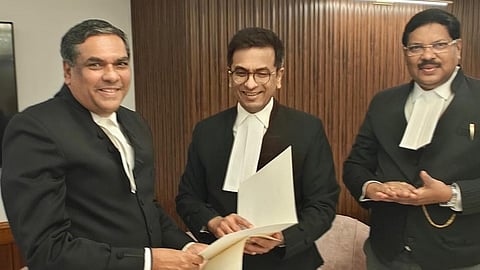

NEW DELHI: Chief Justice of India DY Chandrachud has recommended Senior Supreme Court Judge Sanjiv Khanna to the Union Law Ministry as his successor.
CJI Chandrachud will retire on November 10, 2024. Justice Khanna, would be the 51st CJI and have a tenure of six months before retiring on May 13, 2025, at the age of 65.
Profile of Justice Sanjiv Khanna
Justice Khanna was enrolled as an advocate with the Bar Council of Delhi in 1983 and began his practice in the District Courts of Delhi. After some time, he regularly appeared in the High Court and tribunals in diverse fields, including constitutional law, direct taxes, arbitration, commercial matters, company law, land laws, environmental and pollution laws, and medical negligence.
He also argued several criminal cases in the Delhi High Court as an Additional Public Prosecutor, as well as in cases where he was appointed by the Court as amicus curiae.
Justice Khanna had a long tenure of about seven years as the Senior Standing Counsel for the Income Tax Department in the Delhi High Court. In 2004, he was appointed as the Standing Counsel (Civil) for the National Capital Territory of Delhi.
Elevated to additional judge of the Delhi High Court in 2005, he became a permanent judge in 2006. While serving on the Delhi High Court, he was actively associated with the Delhi Judicial Academy, the Delhi International Arbitration Centre, and the district court mediation centres.
Born on May 14, 1960, Justice Khanna studied law at the Campus Law Centre of Delhi University.
Some of the notable judgments of Justice Khanna in the Supreme Court include upholding the use of EVMs in elections, saying the devices were secure which eliminates booth capturing and bogus voting.
Justice Khanna, who led the bench in the Supreme Court, also delivered the judgment granting interim bail to Arvind Kejriwal. This verdict was highly appreciated by the legal community and litigants for its well-reasoned order.
He was also part of the five-judge bench which declared the electoral bond scheme, meant for funding of political parties as unconstitutional.
Justice Khanna was also part of the five-judge bench which upheld the Centre's 2019 decision abrogating Article 370 of the Constitution which gave special status to the erstwhile state of Jammu and Kashmir.
"He is a very reasoned man. I have known him even before he became a judge in the Delhi High Court in 2005. I have seen many of his orders and judgments, all of which are quite well reasoned and contain logical observations,” a lawyer, who preferred to remain anonymous, told TNIE.
(With inputs from PTI)